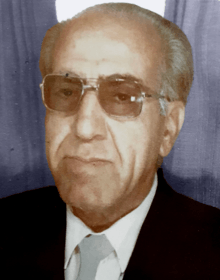Hashem Nasrallah
Sayyid Hashem Hassan Nasrallah (Arabic: هاشم حسن آل نصر الله; February 7, 1923–May 4, 1997) was an Iraqi businessman and the chairman of the Karbala Chamber of Commerce for six terms from 1959 to 1969.[3][4][5][6][7]
Hashem Nasrallah | |
|---|---|
السيد هاشم نصر الله | |
 | |
| Chairman of the Karbala Chamber of Commerce | |
| In office November 1, 1959 – October 29, 1969 (6 terms) | |
| Preceded by | Mehdi al-Hindi[1] |
| Succeeded by | Jawad Abu al-Hab[2] |
| Personal details | |
| Born | Hashim Hassan Hammoud Nasrallah February 7, 1923 Karbala, Iraq |
| Died | May 4, 1997 (aged 74) Karbala, Iraq |
| Relatives | Mohammed Hussain Nasrallah (first cousin, once removed) Aref Nasrallah (first cousin, once removed) |
Early life
Nasrallah was born in February 7, 1923, in Karbala. His father was Hassan Nasrallah (d. 1960), the son of Hammoud Nasrallah (d. October 26, 1901), the head of traders of Karbala in the Ottoman era and a very affluent man.[8] He hails from the noble Al Faiz family, and claims agnatic descent from Muhammad's daughter Fatimah and her husband, Ali, the first Shia Imam.[9] His ancestors on some occasions ruled Karbala, and held custodianship of its holy sites.[10][11]
Career
Nasrallah was nominated for chairman of the Karbala Chamber of Commerce by the traders of Karbala, and in 1959, he took on management of the chamber. He served for six terms, from November 1959 to October 1969, being the longest serving chairman of the chamber.[3]
The chamber began the al-Iqtisad magazine on July 15, 1960, under the supervision of Nasrallah.[12] The chamber issued two magazines a month, and only had nine issues. Its final issue was released in December 15, 1960.[13][14]
Nasrallah enjoyed Arab-Islamic history and culture greatly, and decided to establish a library for the chamber, in 1963.[15] After attaining permission from the higher authority, he formed a committee with employees from the chamber, and had them purchase a plethora of books, ranging from history books to books about business, religion, and science. Members of the committee travelled to other cities such as Baghdad and Najaf to purchase books, until a notable collection of was gathered in the library. The library kept expanding over the years until the 1991 uprising, which saw the Baathist forces destroy Karbala, and this included the chamber, which they burnt, and only a few books remained from the chambers library.[16]
In 1965, Nasrallah endorsed a new date syrup factory in Karbala, along with the Industrial Bank, and the factory was established the following year.[17]
In February 28, 1968, Nasrallah sent a telegram, on behalf of all of Iraq's chambers of commerce, to Mohamed Makiya, endorsing his plans to revolutionize the city of Kufa by building a state of the art university, and large market.[18] However the plans were opposed by the Baathists, who Makiya fell from favour with, and the project never saw light.[19]
Death
Nasrallah spent the end of his life taking care of his library, that contained an array of different books, until he died on May 4, 1997.[5]
See also
- Chamber of Commerce
- List of Iraqi businesspeople
- Al Faiz family
References
- "Dowrat al-Intakhibya – Ghurfat Tijarat Karbala" [Election Terms of the Karbala Chamber of Commerce]. Karbala Chamber of Commerce (in Arabic). Retrieved 16 January 2020.
- The Middle East and North Africa. Europa Publications. 1971. p. 325.
- "Dowrat al-Intakhibya – Ghurfat Tijarat Karbala" [Election Terms of the Karbala Chamber of Commerce]. Karbala Chamber of Commerce (in Arabic). Retrieved 16 January 2020.
- Abbas, Salah (2011-01-01). Ghurfat Tijarat al-Mosul: Dirasah Iqtisadiya, Thaqafiya, Siyasiya [Mosul Chamber of Commerce: A Economical, Cultural and Political Study] (in Arabic). Al Manhal. p. 134. ISBN 9796500016993.
- Ṭuʻmah, Salmān Hādī (1998). Asha'er Karbala Wa 'Usariha [Tribes and Families of Karbala] (in Arabic). Beirut, Lebanon: Dar al-Mahaja al-Baydha'. p. 231.
- al-Khalili, Ja'far (1987). Mowsoo'at al-'Atabat al-Muqadassa (al-Kathimayn) [The Holy Shrines Encyclopedia (al-Kathimayn)] (PDF) (in Arabic). 3. Beirut, Lebanon: Mu'asasat al-A'lami lil-Matboo'at. p. 75.
- Ṭuʻmah, Salmān Hādī (2003). al-Mowroothat wal-Sha'aer Fi Karbala (in Arabic). Beirut, Lebanon: Dar al-Mahaja al-Baydhaa. pp. 55–6.
- Ṭuʻmah, Salmān Hādī (1988). Karbalāʼ Fī al-Dhākirah [Memories Of Karbala] (in Arabic). p. 70.
- Tu'ma, Salman Hadi (1998). 'Asha'ir Karbala Wa Usarha [Tribes and Families of Karbala] (in Arabic). Beirut, Lebanon: Dar al-Muhja al-Baydha'. p. 229.
- Sadr, Sayyid Hassan (1965). Nuzhat Ahl al-Haramayn Fi 'Imarat al-Mashhadayn [A Stroll into the Sights of the Shrines] (in Arabic). Lucknow, India. p. 21.
- Shams al-Din, Sayyid Ibrahim. al-Buyutat al-'Alawiya Fi Karbala [The Alid Households in Karbala] (in Arabic). Karbala, Iraq: Matba'at Karbala. p. 12.
- Ṭuʻmah, Salmān Hādī (1988). Karbalāʼ fī al-dhākirah [Memories Of Karbala] (in Arabic). p. 119.
- "al-Suhuf wal-Majalat Fi Karbala" [Newspaper and Magazines in Karbala]. almadapaper.net (in Arabic). Retrieved 2020-06-20.
- ʻĀlam al-kutub [World of Books] (in Arabic). Dār Thaqīf lil-Nashr wa-al-Taʼlīf. 1984. p. 353.
- "Shyu'iyat Karbala Yahtafoon Bi Ashab al-Maktabat al-Ariqa" [Karbala's Communists celebrate its rich libraries]. Iraqicp (in Arabic). Retrieved 2020-06-20.
- "Awa'el al-Tujjar al-Karbala'iein al-Muntamin Ila Ghurfat Tijarat Karbala" [The early Karbalaei Businessmen to belong to the Karbala Chamber of Commerce]. Karbala Chamber of Commerce (in Arabic). Retrieved 28 January 2020.
- Foreign Agriculture. The Service. 1966. p. 13.
- Makiya, Mohamad (2017-03-21). Khawatir al-Sineen [Memories of the Years] (in Arabic). Dar al-Saqi. ISBN 978-614-425-362-5.
- "Bimunasabat Hulul Arbaeeniyat Shaykh al-Amara al-Baghdadi Muhammad Makkiyya Ra'id al-Emara al-Baghdadi Qussat Kifah wa Hikayat Tanweer" [On the 40th Day after death of the Baghdadi Sheikh of Architecture Mohamed Makiya]. www.altaakhipress.com (in Arabic). Retrieved 2020-06-20.